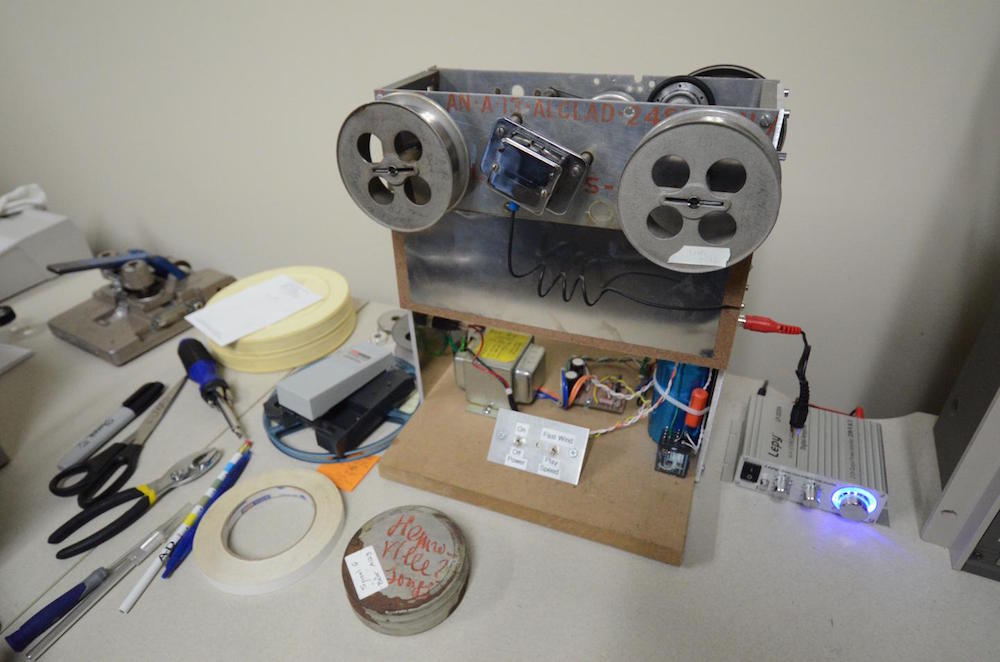Lost Holocaust Songs Played for 1st Time on Repaired Wire Recorder

For the first time in decades, Yiddish and German songs sung by Holocaust victims can be heard, now that an old "wire recorder" has been repaired.
The recordings were completed by the late David Boder (1886-1961), a professor of psychology at the Illinois Institute of Technology. During the summer of 1946, Boder traveled to Europe and interviewed 130 Jewish Holocaust survivors.
Boder conducted the interviews in nine languages at refugee camps in France, Switzerland, Italy and Germany. To record some of the first oral histories of camp survivors, he used a wire recorder, a novel instrument at the time. The device moves a wire across a recording head, a process that magnetizes points along the wire based on features of an electrical audio signal. [Photos: Escape Tunnel at Holocaust Death Site]
In all, Boder's recordings, including those of songs and religious services, took up 200 spools of steel wire.
Some of Boder's recorders were archived in 1967 at the Drs. Nicholas and Dorothy Cummings Center for the History of Psychology at The University of Akron (UA) in Ohio. During a recent effort to digitize the recordings, researchers stumbled across a spool with the Yiddish and German "Henonville Songs." The spool, long thought to be lost, had been sitting in a mislabeled canister, according to a UA statement.
"I think it is one of the most important discoveries from our collections in our 50-year history," David Baker, the executive director of the Cummings Center, said in the statement. "The songs were recorded at a refugee camp in Henonville, France. The Nazis made the prisoners sing some of these songs as they ran to their forced-labor sites and back each day."
Now, Baker and other historians can hear the more than 70-year-old recordings.
Sign up for the Live Science daily newsletter now
Get the world’s most fascinating discoveries delivered straight to your inbox.
"That we could give the world the melody to a song sung by those sentenced to their death through forced labor during one of the most unspeakable horrorsof the 20th century is remarkable," Baker said.
eBay to the rescue
When researchers came upon the spool, none of the wire recorders at the Cummings Center were compatible with the recording, the university said.
After a yearlong search, Litsa Varonis, an instructional designer in Instructional Services at UA, found the right wire-recorder model on eBay. Varonis, who is now retired, bought the recorder and donated it to the center.
Her husband, Orestes Varonis, a retired electrical engineer, helped James Newhall, a senior multimedia producer in Instructional Services at UA, redesign the recorder so that it would work.
"There was a lot of time spent on research and experimentation," Newhall said in the statement. "The recorder no longer uses vacuum tubes or rubber tires, and is mostly built from new parts. It has a simpler, and more accurate, drive mechanism."
Once the machine was functional, Jon Endres, a multimedia producer/media specialist at the Cummings Center, digitized the recordings.
"It felt like I was helping in some way to bring these voices to the present, voices that had become somewhat lost to the historical record," Endres said. "The discovery of this single canister holding a lost recording means that these songs can be heard again, they can be studied and they can inform us in a new way about the experiences, the joys and the frustrations of these displaced persons." [Image Gallery: WWII Lard, Relics Revealed by Storms]
The Cummings Center shared the recordings with the United States Holocaust Memorial Museum in Washington, D.C., whose staff translated the songs. The museum also kept a digitized copy for its own collection.
News of the discovery has spread, with researchers worldwide saying they want to hear the recordings, Baker said.
"These songs, in the voices of those subjected to unspeakable cruelty, are a reminder of the power of memory, the value of history and the indomitable human spirit," Baker said. "Hearing them sing again after 70 years of silence gives the world a greater understanding of the circumstances and experiences of those who were witnesses to a dark chapter in human history."
Original article on Live Science.

Laura is the archaeology and Life's Little Mysteries editor at Live Science. She also reports on general science, including paleontology. Her work has appeared in The New York Times, Scholastic, Popular Science and Spectrum, a site on autism research. She has won multiple awards from the Society of Professional Journalists and the Washington Newspaper Publishers Association for her reporting at a weekly newspaper near Seattle. Laura holds a bachelor's degree in English literature and psychology from Washington University in St. Louis and a master's degree in science writing from NYU.









